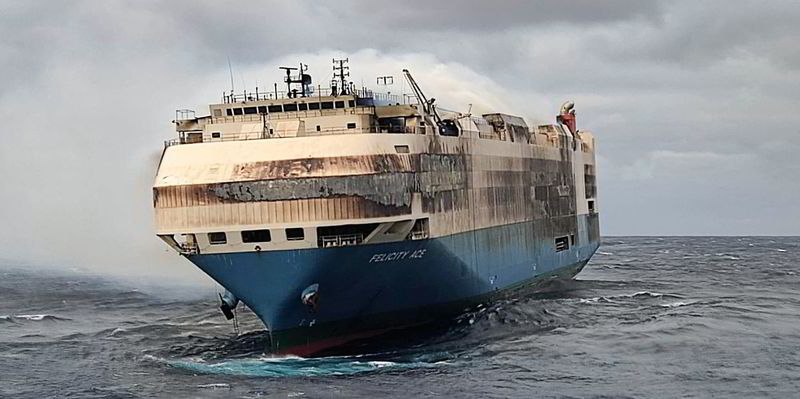The Norwegian shipping company, Havila Kystruten, has banned electric, hybrid, and hydrogen cars from its ferries. After a risk analysis, it was concluded that the risk to the safety of the shipping fleet was too significant. If a vehicle catches fire, the fire can no longer be extinguished.
The risks for ships from the transport of Electric cars (EV) have been discussed since the “Felicity Ace” sank off the Azores, Portugal, last February. E-vehicles on board had caught fire. The fire could not be extinguished. Finally, the colossal ship sank with thousands of electric cars, including Porsche and Bentley “green” vehicles.
Capt. Rahul Khanna, global head of marine consulting at Allianz (AGCS), a marine insurance specialist, explains that the problem with EVs is that lithium-ion batteries in the cars can actually propagate the fire, igniting more vigorously as compared to conventional cars. A single vehicle fire could prove catastrophic.
E-cars are a “danger” for ship passengers
According to a report by the TradeWinds shipping news service, Havila’s Chief executive Bent Martini said the risk analysis showed that the fire in an electric car required a particularly complex rescue operation. The crew on board could not afford this. Passengers would also be at risk. This is different for vehicles with combustion engines. A possible fire is usually easy to fight by the ship’s crew.
After the sinking of the “Felicity Ace,” Greenpeace also warned against e-cars on ships: “In general, electronic components and especially electric vehicles pose a risk for every transport.”
Fire fear: Bent Martini bans electric cars from Havila ropaxes

Norway’s Havila Kystruten will no longer carry electric or hybrid cars on its ferries because of fire fears.
Chief executive Bent Martini said a risk analysis by Proactima had concluded that only blazes starting in conventional vehicles can be dealt with by crews.
Calling the ban a “pure safety assessment”, he added: “A possible fire in electric, hybrid or hydrogen cars will require external rescue efforts and can endanger people on board and the ships.
“We take security seriously, and it is of course a risk we are under no circumstances willing to take.”
Havila Kystruten said it is working to find solutions that can minimise the risk of transporting this type of vehicle in the future.
“We are fully aware that there is a certain expectation, especially from the coastal community, that ships along the coastal route must assist with the transport of private motor vehicles between ports,” Martini said.
“At the same time, it is not a requirement in the agreement with the Ministry of Transport that ships on the coastal route must transport private cars.”
Havila Kystruten’s ships have the largest battery packs installed on any passenger vessels, but the Saevik family-controlled owner said these do not pose a safety risk.
“Our ships are built with their own battery packs, and they are installed in accordance with current requirements for fire safety on ships. This means that our batteries are divided into isolated and fireproof rooms, with specific fire protection systems,” the CEO said.
Electric car fires have been a problem for vehicle carriers.
Owners of these specialised ships are flush with cash and need to spend more on preventing these incidents, insurers have warned owners.
Captain Martti Simojoki of marine insurer Alandia and Geir Jorgensen, Skuld’s global head of loss prevention, said shipping companies should also be spending more on training and equipment.
 Go to content
Go to content